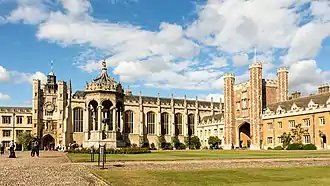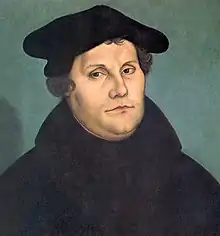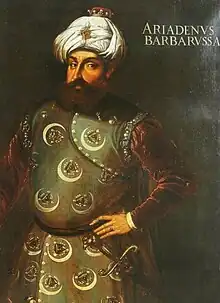1546
Year 1546 (MDXLVI) was a common year starting on Friday (link will display the full calendar) of the Julian calendar.
| Millennium: | 2nd millennium |
|---|---|
| Centuries: | |
| Decades: | |
| Years: |
| 1546 by topic |
|---|
| Arts and science |
| Leaders |
|
| Birth and death categories |
| Births – Deaths |
| Establishments and disestablishments categories |
| Establishments – Disestablishments |
| Works category |
|
| Gregorian calendar | 1546 MDXLVI |
| Ab urbe condita | 2299 |
| Armenian calendar | 995 ԹՎ ՋՂԵ |
| Assyrian calendar | 6296 |
| Balinese saka calendar | 1467–1468 |
| Bengali calendar | 953 |
| Berber calendar | 2496 |
| English Regnal year | 37 Hen. 8 – 38 Hen. 8 |
| Buddhist calendar | 2090 |
| Burmese calendar | 908 |
| Byzantine calendar | 7054–7055 |
| Chinese calendar | 乙巳年 (Wood Snake) 4242 or 4182 — to — 丙午年 (Fire Horse) 4243 or 4183 |
| Coptic calendar | 1262–1263 |
| Discordian calendar | 2712 |
| Ethiopian calendar | 1538–1539 |
| Hebrew calendar | 5306–5307 |
| Hindu calendars | |
| - Vikram Samvat | 1602–1603 |
| - Shaka Samvat | 1467–1468 |
| - Kali Yuga | 4646–4647 |
| Holocene calendar | 11546 |
| Igbo calendar | 546–547 |
| Iranian calendar | 924–925 |
| Islamic calendar | 952–953 |
| Japanese calendar | Tenbun 15 (天文15年) |
| Javanese calendar | 1464–1465 |
| Julian calendar | 1546 MDXLVI |
| Korean calendar | 3879 |
| Minguo calendar | 366 before ROC 民前366年 |
| Nanakshahi calendar | 78 |
| Thai solar calendar | 2088–2089 |
| Tibetan calendar | 阴木蛇年 (female Wood-Snake) 1672 or 1291 or 519 — to — 阳火马年 (male Fire-Horse) 1673 or 1292 or 520 |

December: founding of Trinity College
Events
January–June
- May 19 – The Siege of Kawagoe Castle ends in defeat for the Uesugi clan, in their attempt to regain Kawagoe Castle from the Late Hōjō clan in Japan.
- June 7 – The Treaty of Ardres (also known as the Treaty of Camp) is signed, resulting in peace between the kingdoms of England and France, ending the Italian War of 1542–1546.[1]
July–December
- July 10 – The Schmalkaldic War, a political struggle between imperial forces under Charles V, Holy Roman Emperor, and the Lutheran forces of the Schmalkaldic League, begins.
- November 4 – Christ Church, Oxford, is refounded as a college by Henry VIII of England under this name.
- December 19 – Trinity College, Cambridge, is founded by Henry VIII of England.[2]
Date unknown
- Katharina von Bora flees to Magdeburg.
- Michelangelo is made chief architect of St. Peter's Basilica in Rome.
- The Spanish conquest of Yucatán is completed.
Births
- January 27 – Joachim Friedrich, Elector of Brandenburg (d. 1608)
- February 1 – Mogami Yoshiaki, Japanese daimyō of the Yamagata domain (d. 1614)
- February 4 – Jakob Monau, Polish writer and linguist (d. 1603)
- February 14 – Johann Pistorius, German historian (d. 1608)
- March 16 – Francesco Barbaro, Italian diplomat (d. 1616)
- March 21 – Bartholomeus Spranger, Flemish painter (d. 1611)
- March 25 – Giacomo Castelvetro, Italian writer (d. 1616)
- March 27 – Johannes Piscator, German theologian (d. 1625)
- March 29 – Anne d'Escars de Givry, French Catholic cardinal (d. 1612)
- April 1 – Nanbu Nobunao, Japanese daimyō (d. 1599)
- April 20 – Bernardo de Sandoval y Rojas, Spanish Catholic cardinal (d. 1618)
- June 13 – Tobias Matthew, English Archbishop of York (d. 1628)
- June 14 – Wolfgang, Count of Hohenlohe-Weikersheim, German count (d. 1610)
- June 24 – Robert Parsons, English Jesuit priest (d. 1610)
- June 29 – Dorothea of Denmark, Duchess of Brunswick-Lüneburg (1561-1592) (d. 1617)
- July 4 – Murat III, Ottoman Sultan (d. 1595)[3]
- August 10 – Juliana of Nassau-Dillenburg, Dutch prince (d. 1588)
- August 13 – Jan Opaliński, Polish nobleman and Castellan of Rogozin (d. 1598)
- August 31 – Daniel Adam z Veleslavína, Czech lexicographer (d. 1599)
- September 6 – Pedro Álvarez de Toledo, 5th Marquis of Villafranca, Spanish noble and politician (d. 1627)
- September 11 – Arild Huitfeldt, Danish historian (d. 1609)
- September 13 – Isabella Bendidio, Italian singer and noble in Renaissance court of Ferrara (d. 1610)
- October 5 – Rudolph Snellius, Dutch linguist and mathematician (d. 1613)
- November 11 – Richard Madox, English explorer (d. 1583)
- December 14 – Tycho Brahe, Danish astronomer (d. 1601)[4]
- date unknown
- Luca Bati, Italian Baroque composer (d. 1608)
- Thomas Digges, English astronomer (d. 1595)[5]
- Veronica Franco, Venetian poet and courtesan (died 1591)[6]
- Takeda Katsuyori, Japanese nobleman (d. 1582)
- Mikołaj VII Radziwiłł, Polish magnate (d. 1565)
- probable – Lodewijk Elzevir, Dutch printer (d. 1617)
Deaths
- January 11
- Ernest I, Duke of Brunswick-Lüneburg (b. 1497)
- Gaudenzio Ferrari, Italian painter and sculptor (b. c. 1471)
- January 21 – Azai Sukemasa, daimyō (b. 1491)
- February 18 – Martin Luther, German religious reformer (b. 1483)[7]
- February 23 – Francis, Count of Enghien, French military leader (b. 1519)
- March 1 – George Wishart, Scottish religious reformer (martyred) (b. 1513)
- March 26 – Thomas Elyot, English diplomat and scholar (b. c. 1490)
- April 7 – Friedrich Myconius, German Lutheran theologian (b. 1491)[8]
- May 17 – Philipp von Hutten, German explorer (b. 1511)
- May 28 – Ottaviano de' Medici, Italian politician (b. 1484)
- May 29 – David Beaton, Scottish Catholic cardinal (assassinated) (b. c. 1494)
- June 13 – Fridolin Sicher, Swiss composer (b. 1490)
- July 4 – Khair ad Din "Barbarossa", corsair ruler of Algiers (b. 1475)
- July 9 – Robert Maxwell, 5th Lord Maxwell, Scottish statesman (b. c. 1493)
- July 16 – Anne Askew, English Protestant (burned at the stake) (b. 1521)
- August 1 – Peter Faber, French Jesuit theologian (b. 1506)[9]
- August 3
- Étienne Dolet, French scholar and printer (b. 1509)[10]
- Antonio da Sangallo the Younger, Italian architect (b. 1484)
- August 12 – Francisco de Vitoria, Renaissance theologian (b. 1492)
- November 1 – Giulio Romano, Italian painter (b. 1499)
References
- Williams, Hywel (2005). Cassell's Chronology of World History. London: Weidenfeld & Nicolson. pp. 215–218. ISBN 0-304-35730-8.
- Palmer, Alan; Veronica (1992). The Chronology of British History. London: Century Ltd. pp. 147–150. ISBN 0-7126-5616-2.
- Nina Cichocki (2005). The Life Story of the Çemberlitaş Hamam: From Bath to Tourist Attraction. University of Minnesota. p. 93.
- John Gribbin (2002). Science: a History, 1543-2001. Allen Lane. p. 34. ISBN 978-0-7139-9503-9.
- Johnston, Stephen (2004b). "Digges, Thomas (c.1546–1595)". Oxford Dictionary of National Biography (online ed.). Oxford University Press. doi:10.1093/ref:odnb/7639. (Subscription or UK public library membership required.) The first edition of this text is available at Wikisource: . Dictionary of National Biography. London: Smith, Elder & Co. 1885–1900.
- Rinaldina Russell (1994). Italian Women Writers: A Bio-bibliographical Sourcebook. Greenwood Publishing Group. p. 138. ISBN 978-0-313-28347-5.
- Robert Kolb (December 1, 1999). Martin Luther as Prophet, Teacher, and Hero (Texts and Studies in Reformation and Post-Reformation Thought): Images of the Reformer, 1520-1620. Baker Books. p. 233. ISBN 978-1-4412-3720-0.
- Gross, Ernie. This Day in Religion. New York:Neal-Schuman, 1990. ISBN 1-55570-045-4
- "Blessed Peter Faber", ucanews
- This article incorporates text from a publication now in the public domain: Chisholm, Hugh, ed. (1911). "Dolet, Étienne". Encyclopædia Britannica. Vol. 8 (11th ed.). Cambridge University Press. pp. 387–388.
This article is issued from Wikipedia. The text is licensed under Creative Commons - Attribution - Sharealike. Additional terms may apply for the media files.


